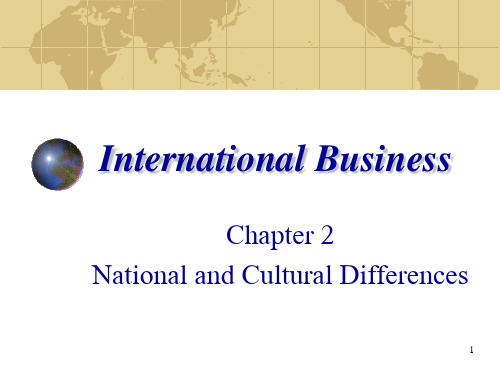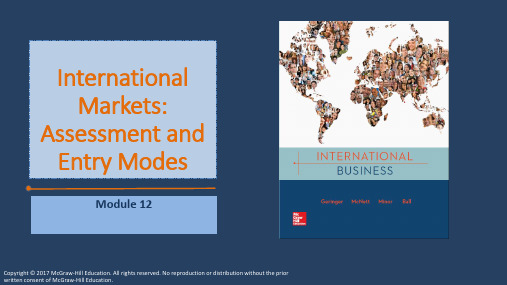国际商务英文版
- 格式:ppt
- 大小:2.17 MB
- 文档页数:40

International Business English国际商务英语Lesson 1 International Business第一课国际商务*International business refers to transaction between parties from different countries. Sometimes business across the borders of different customs areas of the same country is also regarded as import and export, such as business between Hong Kong and Taiwan.*International business involves more factors and thus is more complicated than domestic business. The following are some major differences between the two.1). The countries involved often have different legal systems, and one or more parties will have to adjust themselves to operate in compliance with the foreign law.2). Different counties usually use different currencies and the parties concerned will have to decide which currency to use and do everything necessary as regards conversion etc. Uncertainties and even risks are often involved in the use of a foreign currency.3).Cultural differences including language, customs, traditions, religion, value, behaviour etc. often constitute challenges and even traps for people engaged in international business.4). Countries vary in natural and economic conditions and may have different policies towards foreign trade and investment, making international business more complex than domestic business.*With the development of economic globalisation, few people or companies can completely stay away from international business. Some knowledge in this respect is necessary both for the benefit of enterprises and personal advancement.*International business first took the form of commodity trade, i.e. exporting and importing goods produced or manufactured in one country for consumption or resale in another. This form of trade is also referred to as visible trade. Later a different kind of trade in the form of transportation, communication, banking, insurance, consulting, information etc. gradually became more and more important. This type of trade is called invisible trade. Today, the contribution of service industries of the developed countries constitutes over 60% of their gross domestic products and account for an increasing proportion of world trade. *Another important form of international business is supplying capital by residents of one country to another, known as international investments. Such investments can be classified into two categories. The first kindof investments, foreign direct investments or FDI for short is made for returns through controlling the enterprises or assets invested in in a host country.*The host country is a foreign country where the investor operates, while the country where the headquarters of the investor is located is called the home country. The second kind of investment, portfolio investment, refers to purchases of foreign financial assets for a purpose other than controlling. Such financial assets may be stocks, bonds or certificates of deposit.Stocks are also called capital stocks or bonds. Bonds are papers issued by a government or a firm with promise to pay back the money lent or invested together with interest. The maturity period of a bond is at least one year, often longer, for example five, or even ten years. Certificates of deposit generally involve large amounts, say 25 thousand US dollars *Besides trade and investment, international licensing and franchising are sometimes taken as a means of entering a foreign market. In licensing, a firm leases the right to use its intellectual property to a firm in another country. Such intellectual property may be trademarks, brand names, patents, copyrights or technology. Firms choose licensing because they do not have to make cash payments to start business, and can simply receive income in the form of royaltyBesides, they can benefit from locational advantages of foreign operation without any obligations in ownership or management. The use of licensing is particularly encouraged by high customs duty and non-tariff barriers on the part of the host country. However it is not advisable to use licensing in countries with weak intellectual property protection since the licensor may have difficulty in enforcing licensing agreement.*Franchising can be regarded as a special form of licensing. Under franchising, a firm, called the franchisee, is allowed to operate in the name of another, called the franchiser who provides the former with trademarks, brand names, logos, and operating techniques for royalty. In comparison with the relation between the licenser and the licensee, the franchiser has more control over and provides more support for the franchisee.*The franchiser can develop internationally and gain access to useful information about the local market with little risk and cost, and the franchisee can easily get into a business with established products or services. Franchising is fairly popular especially in hotel and restaurant business.*Other forms for participating in international business are management contract, contract manufacturing, and turnkey project.*Under a management contract, one company offers managerial or other specialized services to another within a particular period for a flat payment or a percentage of the relevant business volume. Sometimes bonusesbased on profitability or sales growth are also specified in management contracts.Government policies often have a lot to do with management contracts. When a government forbids foreign ownership in certain industries it considers to be of strategic importance but lacks the expertise for operation, management contracts may be a practical choice enabling a foreign company to operate in the industry without owning the assets*By contract manufacturing, a firm can concentrate on their strongest part in the value chain, e.g. marketing, while contracting with foreign companies for the manufacture of their products. Such firms can reduce the amount of their resources devoted to manufacture and benefit from location advantages from production in host countries. However, loss of control over the production process may give rise to problems in respect of quality and time of delivery.*For an international turnkey project, a firm signs a contract with a foreign purchaser and undertakes all the designing, contracting and facility equipping before handing it over to the latter upon completion. Such projects are often large and complex and take a long period to complete. Payment for a turnkey project may be made at fixed total price or on a cost plus basis. The latter way of payment shifts the burden of possible additional cost over the original budget onto the purchaser *BOT is a popular variant of the turnkey project where B stands for Build, O for operate and T for transfer. For a BOT project, a firm operate a facility for a period of time after building it up before finally transferring it to a foreign company. Making profit from operating the project for a period is the major difference between BOT and the common turnkey project. Needless to say, the contractor has to bear the financial and other risks that may occur in the period of operation.*Some Words and Expressionscustoms area 关税区in compliance with 遵从,遵照conversion n.货币兑换visible trade 有形贸易resale n.转售invisible trade 无形贸易gross domestic product 国内生产总值for short 缩写为account for 占……比例headquarters n.总部trap n.陷阱,圈套portfolio investment 证券投资stocks n.股票bonds n.债券maturity n.(票据等)到期,到期日certificate of deposit 大额存单other than 而不是licensing n.许可经营franchising n.特许经营n.商标advisable adj.可行的,适当的patent n.专利royalty n.专利使用费,许可使用费,版税copyright n.版权licensor n.给予许可的人licensee n.接受许可的人franchiser n.给予特许的人franchisee n.接受特许的人logo n.标识,标记management contract 管理合同expertise n.专门知识bonus n.红利,奖金,津贴flat adj.一律的,无变动的contract manufacturing 承包生产value chain 价值链turnkey project 交钥匙工程BOT(Build, Operate, Transfer)建设,经营,移交Stand for 表示,代表variant n.变形,变体Lesson twoIncome Level and the World Market第二课收入水平和世界市场This lesson discusses the relation between the income level and the market potential, and the features of high income, middle income and low income markets.Special analyses are made on Triad, i.e. the markets of North America,European Union and Japan, as well as other markets that are closely related with China.The first two paragraphs mainly deal with GNP and GDP, two important concepts usedto indicate the total size of an economy. GDP, Gross Domestic Product, stresses the place of production while GNP, Gross National Product, on the ownership of production factors.GDP is used by most countries now where as GNP was more popular before the 1990s. The actual figures of a country’s GNP and GDP are, however, quite similar in most cases and we can use whichever figure that is available.TEXT:In assessing the potential of a market, people often look at its income level since it provides clues about the purchasing power of its residents. The concepts national income and national product have roughly the same value and can be used interchangeably if our interest is in their sum total which is measured as the market value of the total output of goods and services of an economy in a given period, usually a year. The differenceis only in their emphasis. The former stresses the income generated by turning out the products while the latter, the value of the product s themselves. Gross National Product, GNP, and Gross Domestic Product, GDP, are two important concepts used to indicate a country’s total income. GNP refers to the market value of goods and services produced by the property and labor owned by the residents of an economy. This term was used by most governments before the 1990s国民生产总值(GNP)是最重要的宏观经济指标,它是指一个国家地区的国民经济在一定时期(一般1年)内以货币表现的全部最终产品(含货物和服务)价值的总和。


2024年国际商务协议英文版翻译示例本合同目录一览1. 协议概述1.1 协议类型1.2 协议方1.3 协议日期2. 定义与解释2.1 专业术语2.2 地点与日期2.3 涉及的组织与个人3. 商务条款3.1 产品或服务描述3.2 数量与质量3.3 价格与支付方式3.4 交付与交货期限3.5 违约责任4. 权利与义务4.1 协议方的权利4.2 协议方的义务5. 保密协议5.1 保密信息5.2 保密期限5.3 信息的使用与披露6. 争议解决6.1 协商解决6.2 调解6.3 仲裁7. 法律适用7.1 法律的选取7.2 法律的适用8. 强制性规定8.1 协议的适用法律8.2 协议的适用法规9. 合同的生效与终止9.1 生效条件9.2 终止条件9.3 终止后的权利与义务10. 一般条款10.1 通知10.2 修改与补充10.3 完整协议11. 第三方受益人11.1 第三方受益人的权益11.2 第三方受益人的责任12. 保险12.1 保险的要求12.2 保险的赔偿范围13. 知识产权13.1 知识产权的保护13.2 知识产权的使用权14. 不可抗力14.1 不可抗力的定义14.2 不可抗力事件的处理第一部分:合同如下:1. 协议概述1.1 协议类型本协议为2024年国际商务协议英文版翻译示例,由双方在平等、自愿、公平、诚实信用的原则基础上签订。
1.2 协议方甲方:(公司名称/个人姓名)乙方:(公司名称/个人姓名)1.3 协议日期本协议签订日期为2024年国际商务协议英文版翻译示例之日期,具体日期由双方共同商定。
2. 定义与解释2.1 专业术语(1)产品:指乙方根据甲方要求提供的商品或服务。
(2)交付:指乙方按照本协议约定,将产品转移给甲方占有或使用的行为。
2.2 地点与日期本协议项下的一切活动,包括但不限于交付、付款、争议解决等,均在本协议约定的地点进行。
2.3 涉及的组织与个人本协议涉及的包括但不限于甲乙双方的工作人员、负责人、代表、代理人等。



●The foreign exchange market is a market for converting the currency of one country into that of another country.●The exchange rate is the rate at which one currency is converted into another.●Two main functions of the foreign exchange market:1、is used to convert the currency of one country into the currency of another2、provide some insurance against foreign exchange risk (the adverse consequences of unpredictable changes in exchange rates)●Spot Exchange Rate 即期汇率:The rate at which a foreign exchange dealer converts one currency into another currency on a particular day.●Forward Exchange Rate 远期汇率:Two parties agree to exchange currency and execute the deal at some specific date in the future.●Currency Swap 掉期(货币互换):The simultaneous purchase and sale of a given amount of foreign exchange for two different value dates.●international monetary system: Refers to the institutional arrangements that govern exchange rates.● currency speculation:the short-term movement of funds from one currency to another in the hopes of profiting from shifts in exchange rates ●A floating exchange rate system 浮动汇率exists when a country allows the foreign exchange market to determine the relative value of a currency.●A pegged exchange rate system 钉住汇率exists when a country fixes the value of its currency relative to a reference currency.●A dirty float 管理浮动exists when a country tries to hold the value of its currency within some range of a reference currency such as the U.S. dollar.●A fixed exchange rate system 固定汇率exists when countries fix their currencies against each other at some mutually agreed on exchange rate.●Investors include corporations with surplus cash, individuals, and non-bank financial institutions.●Borrowers include individuals, companies, and governments.●Markets makers are the financial service companies that connect investors and borrowers, either directly or indirectly.●Capital market loans can be equity (stock)or debt ( cash loans or bonds).Equity (stock) Loans 股权融资An equity loan is made when a corporation sells stock to investors. (dividends, stock price)Debt ( cash loans or bonds) Loans 债券融资A debt loan requires the corporation to repay a predetermined portion of the loan amount (the sum of the principal plus the specified interest) at regular intervals regardless of how much profit it is making.●A Eurocurrency欧洲货币is any currency banked outside of itscountry of origin.About two-thirds of all Eurocurrencies are Eurodollars (dollars banked outside the United States).●Foreign bonds外国债券ar e sold outside the borrower’s country and are denominated in the currency of the country in which they are issued.●Eurobonds欧洲债券are underwritten by a syndicate of banks(国际银团)and placed in countries other than the one in whose currency the bond is denominated.●A firm’s strategy refers to the actions that managers take to attain the goals of the firm.一个企业的战略可定义为管理人员为达到企业的目标而采取的行动。